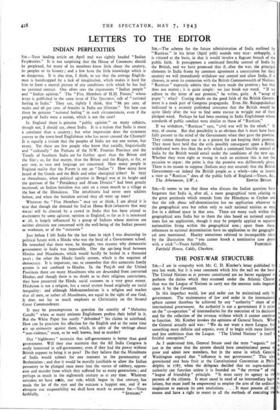INDIAN PERPLEXITIES
LETTERS TO THE EDITOR
SIR,—Your leading article on April 2nd was rightly headed "Indian Perplexities." It is not surprising that the House of Commons should be perplexed, for many of its members know little about the country, its peoples or its history ; and a few have the little knowledge which is so dangerous. It is also true, I think, to say that the average English- man is handicapped by a lack of imagination, which makes it hard for
him to form a mental picture of any conditions with which he has had no personal contact. One often sees the expressions " Indian people" and " Indian opinion." The "Five Members of H.M. Forces," whose
letter is published in the same issue of The Spectator, talk of " national feeling in India." They say, rightly I think, that " 86 per cent. of males and 98 per cent. of females in India are illiterate." Yet how can there be genuine " national feeling " in such circumstances, even if the people of India were a nation, which is not the case?
In England there is genuine " public opinion " on many subjects, though not, I should say, about India. It is a truism that India is more a continent than a country ; but what impression does the statement convey to the town-bred Englishman who has never crossed the Channel?
It is equally a truism that the peoples of India are not one nation, but many. Yet there are few people who know that racially, linguistically and "culturally " the Pathans of the N.W. Frontier Province and the Tamils of Southern India are far further apart than the Briton and the Slav ; or, for that matter, than the Briton and the Rajput, as far, at any rate, as race and language are concerned. How many people in England realise that the Parsee is not an " Indian "? How many have beard of the Gonds and the Bhils and other aboriginal tribes? In 1935 or thereabouts, when political agitation in Bengal was at its height and the garrison of the " Presidency and Afsam District " had been greatly increased, an Indian battalion was sent on a route march to a village at the foot of the Himalayas. The inhabitants had never seen soldiers before, and when the battalion arrived they all went up trees!
Whatever the " Five Members " may say or think, I am afraid it is true that though the demand for Indan Home Rule (whatever that may
mean) will be cheered by a crowd in India that has been stirred to excitement by some agitator, opinion in England, as far as it is interested at all, is largely influenced by a group of Indians whose motives are neither altruistic nor concerned with the well-being of the Indian peasant or workman, or of the " outcastes "
Just before I left India for the last time in t936 I was discussing its political future with a Hindu who was the head of a Government school. He remarked that there were, he thought, two reasons why democratic government in India was impossible. One the age-long feud between Hindus and Musalmans, which would hardly be healed in a thousand years ; the other the Hindu family system, which is the negation of democracy. It is important, too, to remember that this autocratic family system is not confined to Hindus. In the Punjab and the United Provinces there are many Musalmans who are descended from converted Hindus, and though there is no doubt as to their religious convictions, they have preserved the Hindu social customs to a very great extent.
Hinduism is not a religion. but a social system based originally on racial inequality: and although Mohammedanism is a religion and teaches that all men, or rather all Musalmans, are equal in the sight of one God, it does not lay so much emphasis as Christianity on the Second Great Commandment.
It may be presumptuous to question the sanctity of "Mahatma Gandhi " when so many eminent Englishmen profess their belief in it.
But the White Paper has surely " debunked " his claims to sainthood. How can he proclaim his affection for the English and at the same time stir up animosity against them, which, in spite of the verbiage about " non-violence," must, as he well knows, lead to murder?
Our " highbrows " maintain that self-government is better than good government. Will they also maintain that the All India Congress is really interested in self-government, even if they had the power without British support to bring it to pass? Do they believe that the Musalmans of India would submit for one moment to the paramountcy of Brahminism ; and that it would be morally justifiable to allow the Indian peasantry to be plunged once more into the vortex of robbery, oppres- sion and murder from which they suffered for so many generations ; and perhaps as much in the eighteenth century as at any time. Whatever mistakes we have niltde, our rule, which began in that century, has made the lot of the ryot and the outcaste a happier one, and if we abrogate our responsibility we shall have much to answer for.—Yours


























 Previous page
Previous page